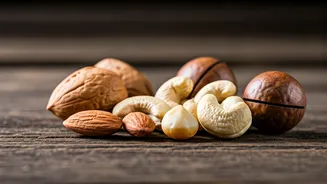Quinoa: The Truth
Quinoa, a grain-like seed, is often celebrated for its protein content. However, it also contains a considerable amount of fat, making it a double-edged
sword for weight loss. The nutritional profile of quinoa includes a moderate amount of fat that, while healthy in some contexts, can contribute to overall calorie intake. One cup of cooked quinoa has about 5-6 grams of fat, along with a significant calorie count, which is something weight-conscious individuals should take into account. While quinoa offers fiber and various vitamins, its fat content and caloric density mean it might not be the best choice as a staple food for weight loss. Therefore, it's wise to consider portion sizes and balance quinoa with other foods that are lower in fat to manage weight effectively.
Nuts: Hidden Calories
Nuts are a beloved snack, lauded for their heart-healthy fats and protein. However, they are also calorie-dense. While nuts are rich in nutrients, the high-fat content means they can significantly increase overall calorie intake. A small handful of nuts can contain a substantial number of calories. For example, a quarter cup of almonds, a popular nut, can have over 160 calories and around 14 grams of fat. This high-fat density and calorie count mean that excessive consumption can hinder weight loss efforts, especially if portion sizes are not carefully monitored. The best approach is to enjoy nuts in moderation, as part of a balanced diet, carefully measuring serving sizes to prevent overeating and maximize weight loss.
Avocados: Healthy Fats
Avocados are known for their creamy texture and monounsaturated fats, considered beneficial for health. The high-fat content of avocados, however, can be a concern for those focused on weight loss. One whole avocado contains a substantial amount of fat, which contributes to its high caloric value. While the fats in avocados are heart-healthy, eating too much can lead to a caloric surplus, thus hindering weight management. A medium avocado might pack about 320 calories and about 30 grams of fat. The key is portion control. Incorporating a limited amount of avocado into your diet can still provide beneficial nutrients without a significant impact on weight loss. Considering avocado's high-fat density and calorie count is essential when building a weight loss diet.
Chia Seeds: Small but Mighty
Chia seeds have garnered acclaim for their fiber, protein, and omega-3 fatty acids. These tiny seeds also come with a notable amount of fat. Although chia seeds are packed with nutrients, they're relatively high in calories per serving because of their fat content. A two-tablespoon serving of chia seeds contains approximately 9 grams of fat and about 140 calories. Those numbers add up quickly if you sprinkle them liberally over meals. Considering the fat and calorie density of chia seeds, using them in moderation is important. Mixing them into your diet in controlled quantities can provide health benefits without impeding your weight loss goals.
Coconut: A Tropical Trap
Coconut, in various forms, is a popular ingredient known for its tropical flavor and versatility. Despite its health benefits, coconut can be a source of significant fat, which could be a hurdle for weight loss. Coconut meat, oil, and milk are relatively high in saturated fats. A one-cup serving of shredded coconut, for example, can have around 300 calories, with a hefty portion coming from fat. Using coconut in moderation is very important to manage your weight. While it can offer delightful flavor and potential health advantages, its high-fat profile necessitates mindful consumption, particularly when focusing on a weight-loss diet. Paying close attention to portion sizes will assist in managing overall caloric intake and staying on track with weight loss plans.











